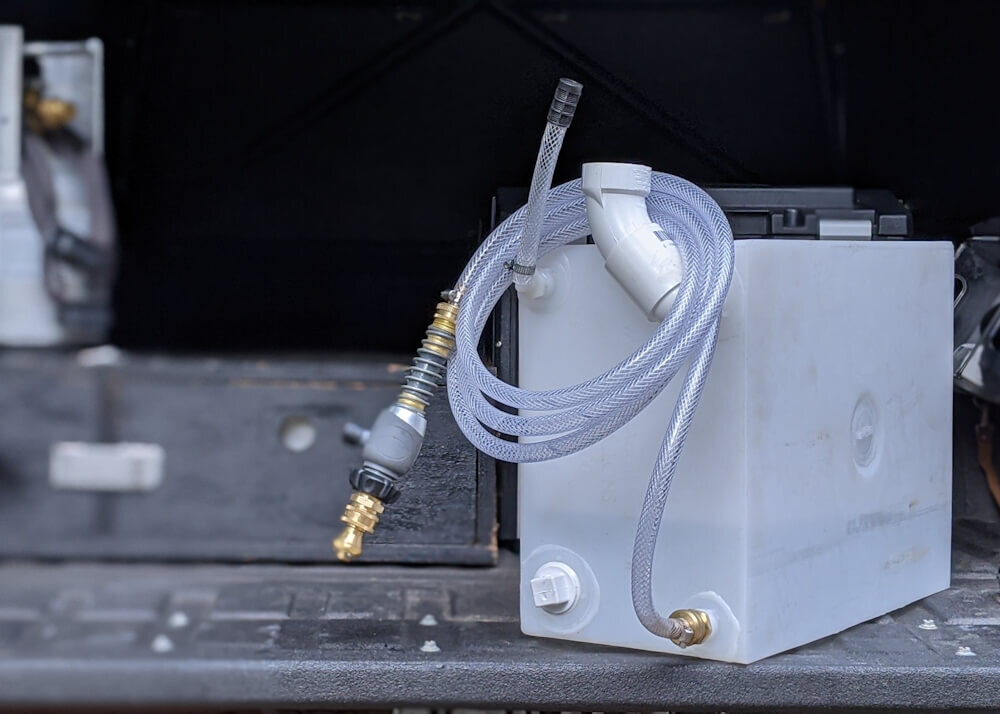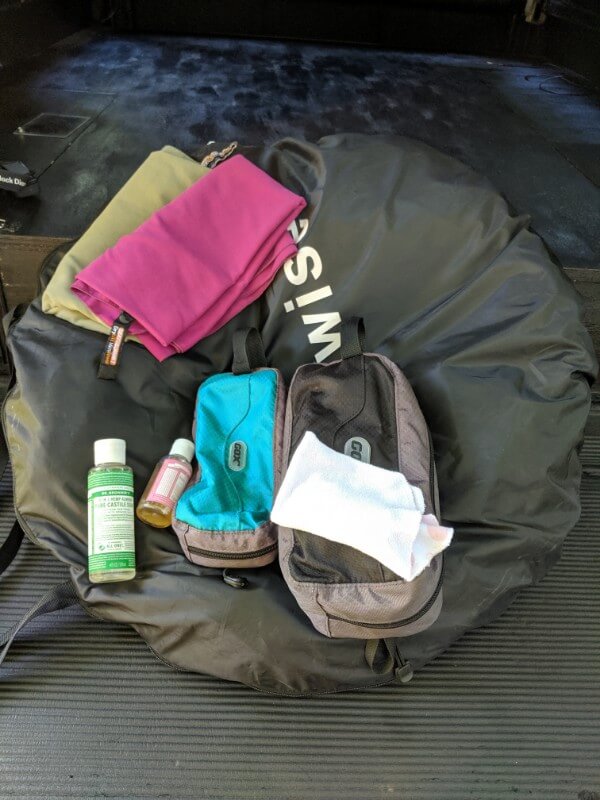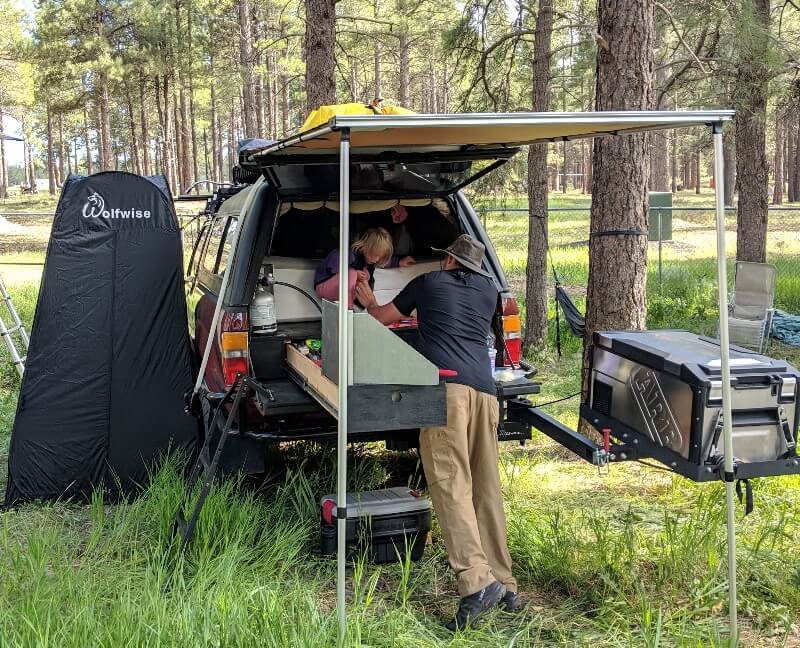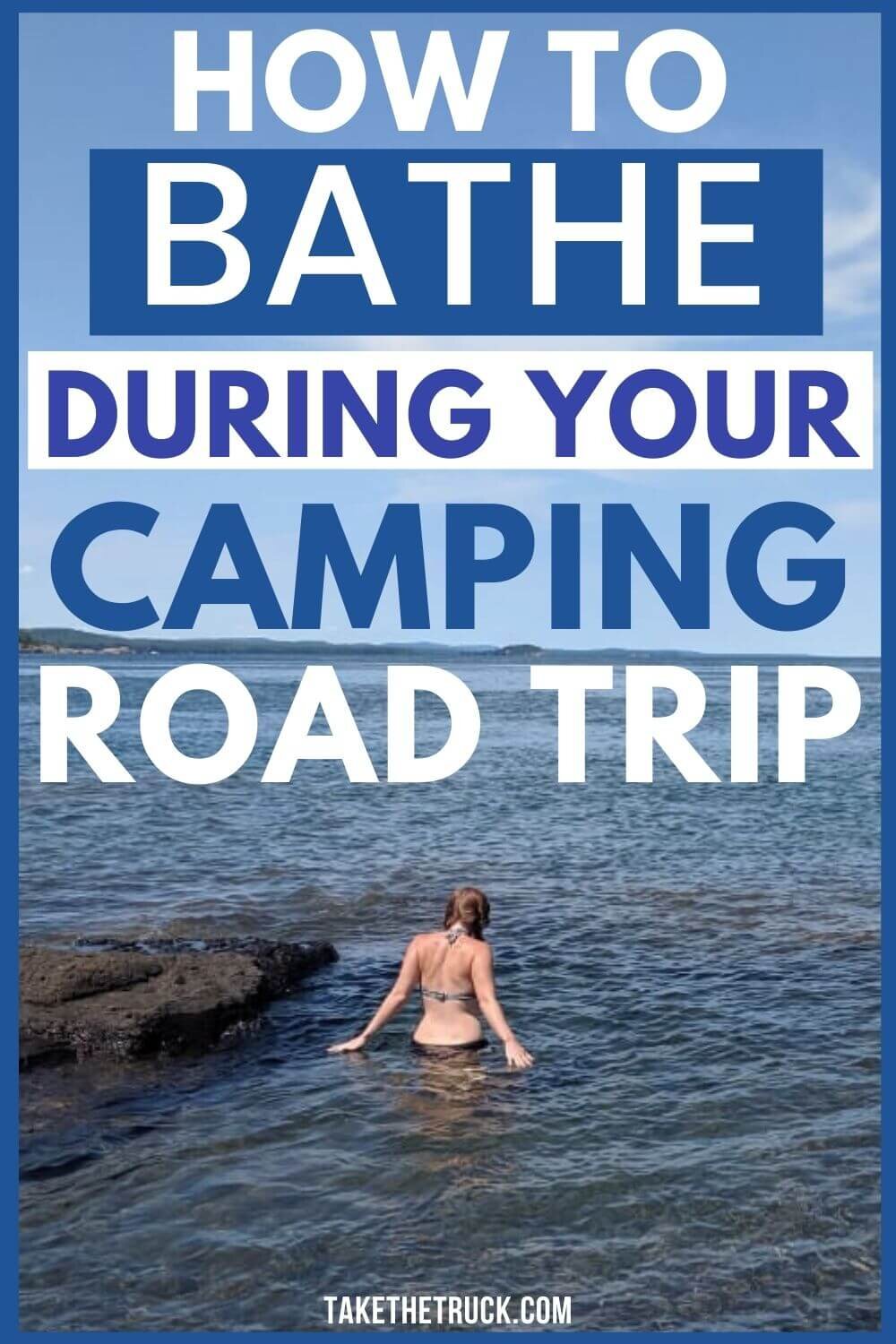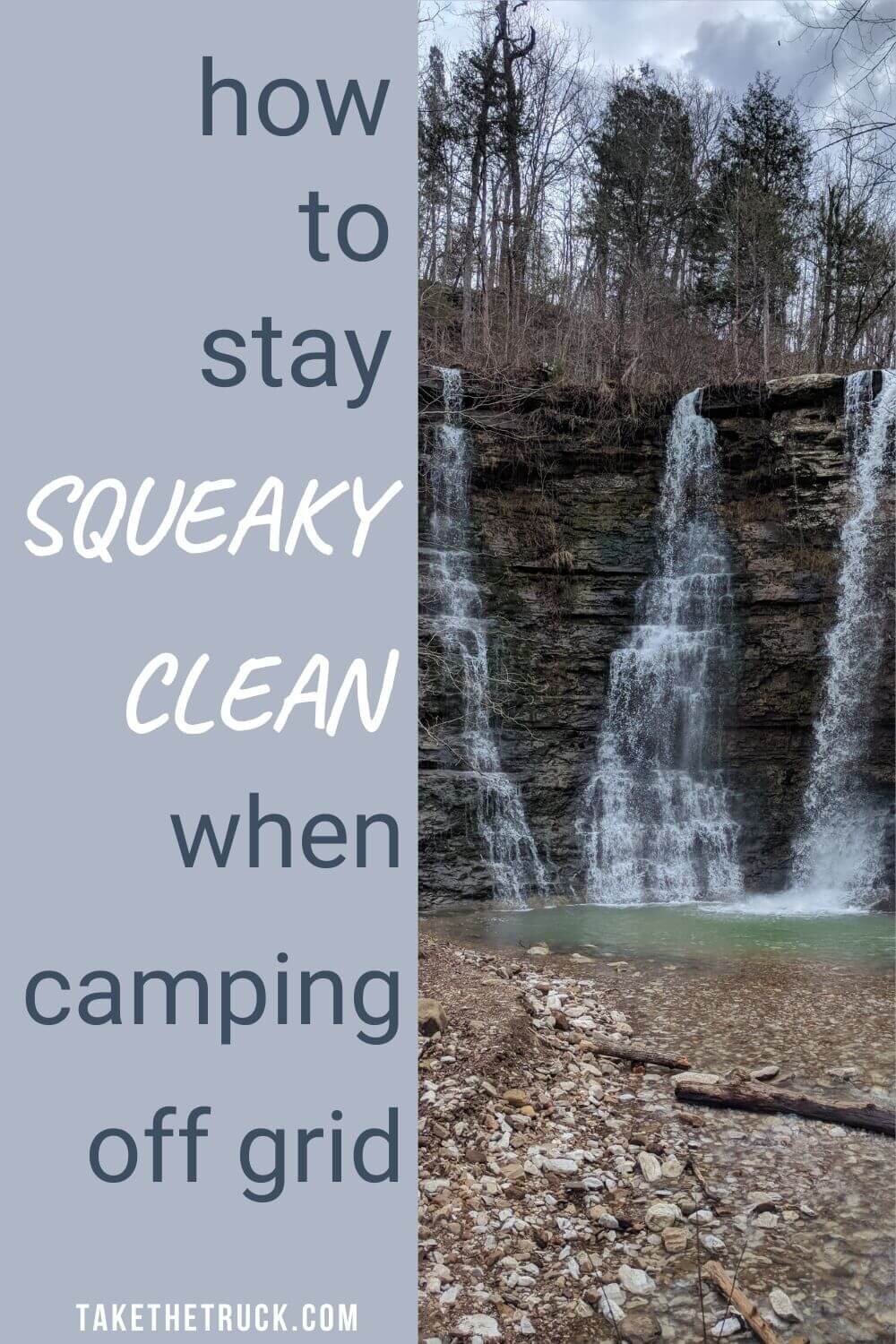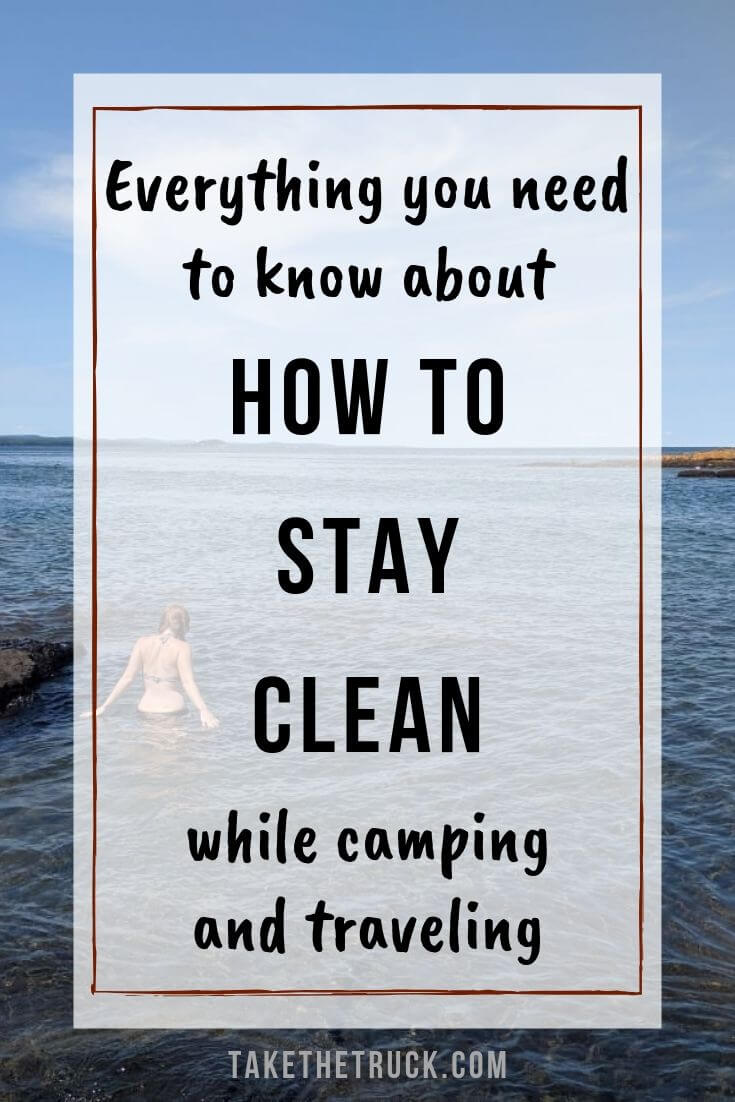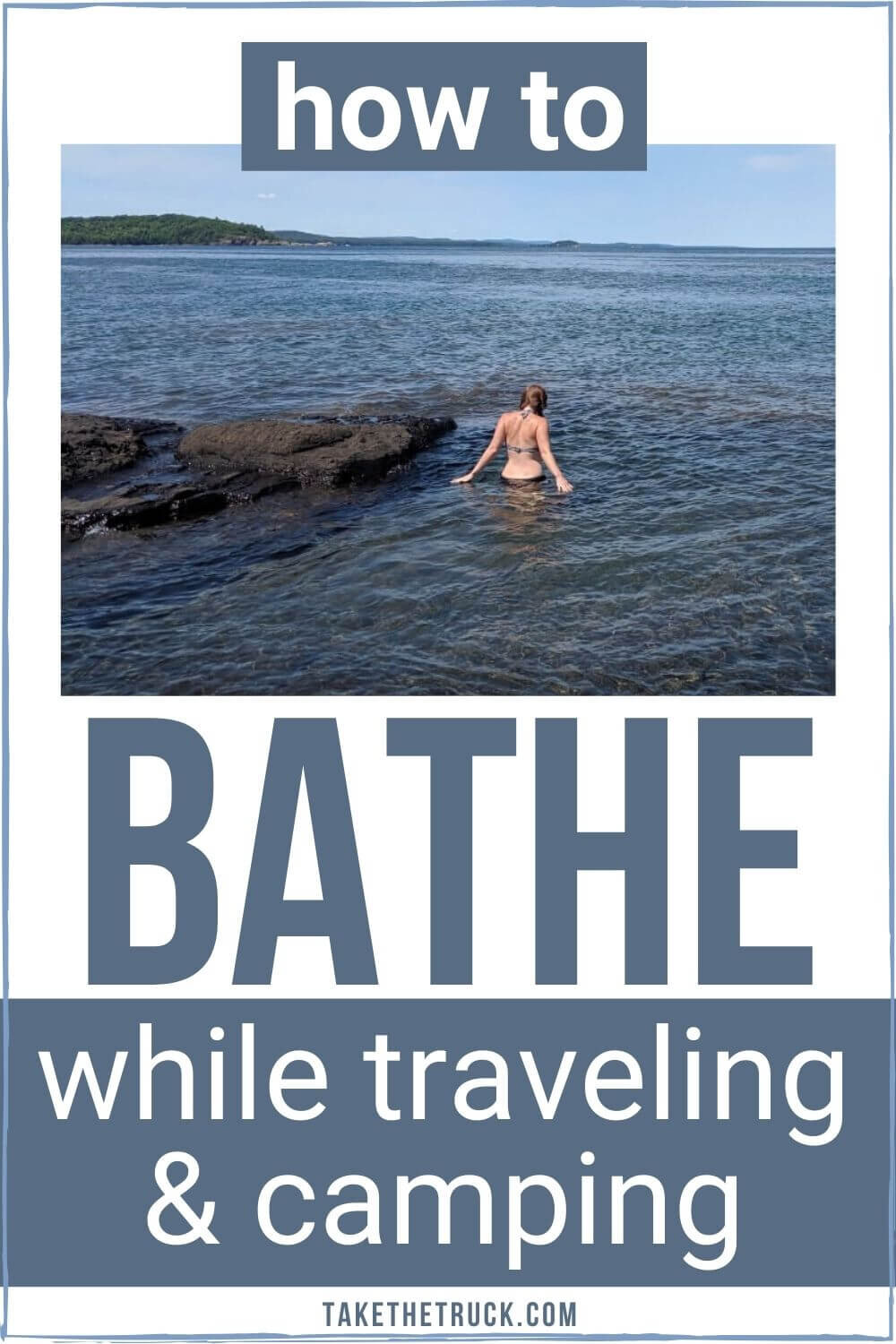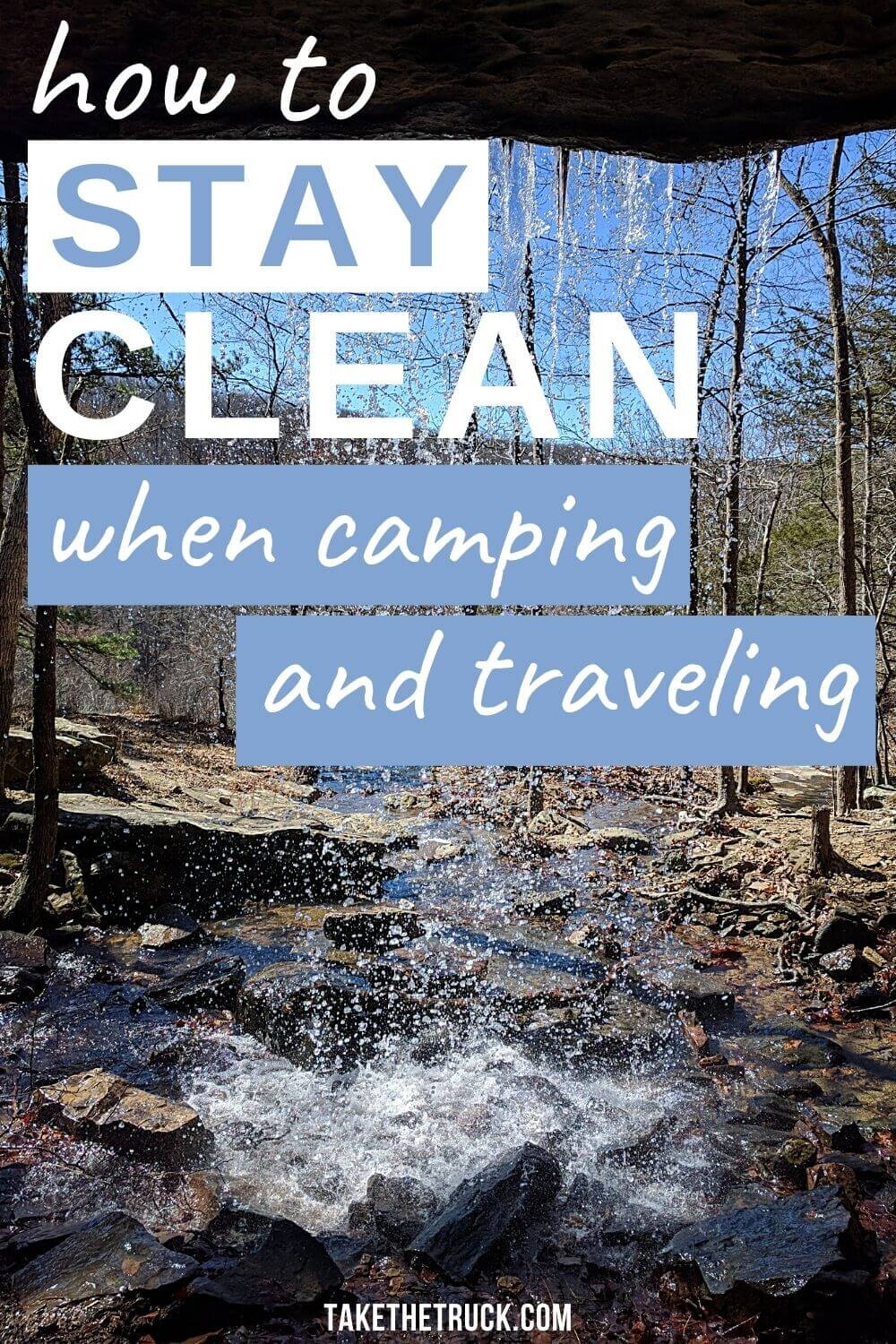Camping Hygiene: How to Bathe While Camping and Traveling
To be honest, bathing while camping and traveling can be a challenge - especially as a family, in a truck bed camper. But having a good system for maintaining proper camping hygiene is absolutely vital to enjoying your time both on the road and at camp.
So over the years we’ve spent a great deal of time figuring out some of the best ways to bathe while camping and traveling.
*(This post contains affiliate links. This means we may receive a small commission, at no additional cost to you, if you make a purchase through a link. See our full disclosure.)
STEP 1: Determine Your Personal BATHING Needs For Proper Camping Hygiene
No one likes to stink, but no two people stink the same. You may be comfortable skipping a shower for 2-3 days at a time, or you may feel the need to bathe everyday.
Whatever the case, figuring out how long you can go - comfortably - without bathing will help you plan your bathing method(s) for your next camping trip or adventure while still maintaining a good level of camping hygiene.
Having the right clothing can make a HUGE difference here because certain fabrics retain body odor and moisture more than others.
We highly recommend collecting a camping and travel wardrobe that is constructed of high-quality wool and synthetic materials - here are some recommendations to get you started based on our personal experience:
Wool Shirts - We have used Woolx* and Icebreaker* brand tops, and have been happy with the comfort, durability, and fit. And it’s incredible how long they stay fresh.
Wool Socks - We’ve used Sockwell Ascend* and Cloudline*, and can wear them multiple days without washing.
Travel Underwear - the ExOfficio underwear* we use are comfortable, durable, and extremely easy to clean and air dry.
Also doing regular laundry while camping will help extend your bathing intervals, and if your clothes are wool and/or synthetic they will also dry faster, making laundry much more manageable.
STEP 2: Consider Your Water Usage While Maintaining Good Camping Hygiene
Depending on where your camping adventures take you, water management can be the most challenging aspect of bathing and keeping good camping hygiene practices - because you’re limited to your vehicle’s water storage and the availability of potable water for refilling it.
If you’re traveling in a full-size class A motorhome with 100+ gallon storage tanks, no problemo.
But if you’re limited to only 5-10 gallons of water storage and are in an area where access to potable water is scarce (e.g., Southeast Utah) you’ll have to plan ahead to conserve your water, and adapt your bathing and hygiene methods accordingly.
Water Conservation Techniques
Here are some of the conservation techniques we utilize when it comes to bathing while camping and traveling:
Forgo Washing Your Hair - Washing hair uses a ton of water, and this is an easy way to save both time and water.
You can read all about the No Poo method here, or you can use dry shampoo*
Learn to Take a Navy Shower - Wet, turn off the water, scrub, then turn on the water to rinse. This can be done in less than 2 minutes and often with only a gallon of water with practice.
Sponge Bathe - this obviously utilizes far less water than a traditional shower
And for other general water conservation tips when camping off grid, head over to this post.
Water Storage
If you’re truck camping or car camping, the ability to store water in or on your vehicle is indispensable, and there are literally hundreds of different manufacturers that make water storage solutions you can use in your vehicle.
We’ve used and liked two different water storage and camping shower combo options over the years (more on this below). However, the trusty 7 gallon blue water container (like this one*) most of us grew up camping with works fine too.
We also recommend having a high-quality water purifier* you can trust, so you can utilize any naturally available water safely if the need or opportunity arises.
Step 3: Select a Method of Bathing For Maintaining good Camping Hygiene
There are four primary methods for bathing while camping and traveling that will allow you to maintain good camping hygiene:
1) Using a Portable Camp Shower
The options for portable camp showers are virtually endless, with new gadgets and DIY solutions popping up seemingly every day - your only limitations will be budget, space in your vehicle, and imagination.
So let's just walk through the three basic categories of portable showers so you can determine what’s right for you and your own camping setup.
Pressurized Camping Showers - These camp showers are a great option if you don’t already have a water storage solution, because they can also serve as a water storage tank.
To use, you simply fill the tank with water and pressurize the tank with a standard bicycle pump or 12 volt air compressor, and then you can adjust the flow-rate of the water, just like with your faucet at home. So for comparison sake when considering a pressurized camp shower, note that the average household water pressure is approximately 45-50 PSI.
Another advantage to this option is that most pressurized camping showers can be easily stored on the exterior of your vehicle, saving precious interior space for other gear.
Yakima RoadShower* - This is the model (pictured above) that we initially selected for truck camping, though it is one of the more costly options.
The 7 gallon model we chose stored all of our water and was used for everything from kitchen cleanup, showering, and refilling drinking water to rinsing off dirty gear, and doing laundry. A fill will typically last anywhere from 2-3 days for our family of three, and it’s aluminum construction is rock solid.
It can also be safely pressurized up to 65 PSI, which typically only requires one air-up per fill. Plus it has a built in pressure release valve for added safety, can be easily mounted to most vehicle cargo racks, and comes in 4, 7, and 10 gallon capacities.
For more specifics on why we landed on the Yakima Roadshower, head over to our detailed review of the Road Shower.
WaterPORT Day Tank* - This model is plastic (as opposed to aluminum) so it has the advantage of being lighter and more portable. And can be pressurized with a bicycle pump, 12v compressor, OR the company also offers a manual pump cap. However, It only comes in one 3.8 gallon capacity, but has a very good selection of mounting options and can be pressurized up to 50 PSI.
Then there are DIY options like this one, with the major downside being that the parts will likely still cost well over $100, and they cannot be safely pressurized as high so they have to be aired up multiple times per fill. Because it’s constructed of ABS pipe, the capacity is determined by what length you make it. But max pressure is typically only around 30 PSI.
Electric Camping Showers - These utilize a rechargeable or 12v battery powered pump to draw water from a container to bathe. These are great when water conservation isn’t as much of a concern, because there is no way to regulate the flow-rate.
Invation Portable Outdoor Shower* - This model consists of a battery powered pump, siphon, and shower head. We liked this unit because it has a relatively conservative 0.66 gallon/minute flow rate that lasts up to an hour per charge.
Gravity Camping Showers - These camp showers are super basic: fill the bag or bottle, hang it overhead, and let gravity do the work. The advantage being there’s less moving parts to break and they’re generally more compact, the downside being that the flow rate is usually pretty low and we’ve found them cumbersome to use at times. Here are the ones we considered and/or have used in the past:
Sea-to-Summit Pocket Shower* - This is a great and very compact bag-style gravity shower and the twist valve lets you easily control the flow rate.
Simple Shower* - This will screw onto most plastic soda-type 2L bottles offering a “simple” and extremely compact way to take a shower while camping
DIY Gallon Jug - Just take a clean plastic jug with a screw-on lid, drill 8-10 small holes in the lid in a shower head pattern, drill a small hole in the bottom of the jug to prevent a vacuum, and wala! A super basic camp shower.
DIY Combination Gravity/Electric Camping Shower
You can also make a DIY Camping Shower & Water Container like the one we currently use. When we upgraded to a wedge camper, we designed this simple, yet versatile, 10 gallon DIY camping shower for vehicle camping that can be used as either a gravity fed camp shower or in combination with a 12v electric water pump to pressurize the camping shower if needed.
2) Sponge Bathing
Sponge bathing is exactly what it sounds like, a little warm water, a washcloth or sponge, and some soap. We use this method for “maintenance bathing” when water is scarce and we’re trying to stretch our time off-grid.
Warm some water on the camp stove
Apply a couple drops of Castile Soap (we recommend Dr. Bronners*) to a whetted washcloth or sponge
Wash a section
Rinse
Repeat until fully bathed
In a pinch, wet wipes can also be used for sponge bathing while camping and require no water usage. We recommend keeping a few of these biodegradable wet wipes* on hand - they’re good enough to get you through to your next proper bath/shower.
3) Bathing Au Naturel
If you’re camped near or have access to a river, stream, lake, hot spring, etc. take advantage!
Just make sure it’s permitted, and always utilize biodegradable and environmentally safe soap, like a trusty bottle of Campsuds* or Dr Bronners*.
4) Public Showers
Using public showers is by far the easiest method for most to use while traveling and camping.
The hardest part is knowing where to find them when on the road, so here are some suggestions of places to look for access to public showers:
Established Campgrounds - like those found in state parks, KOA Campgrounds, or Corps of Engineers Campgrounds typically allow you access to their pay-for showers as part of the day-use fee
Truck Stops - Most offer pay-for showers for truck drivers and the public as well
City or Rec Center Pools - go for a swim then use the shower!
Public Beaches - often offer outdoor showers for rinsing off, and usually for free
Gyms - if you have a membership to a national chain, stop and get a work out and a shower on the road
Though the sanitation of these facilities may give you pause, we’ve found that the majority are properly cleaned and maintained regularly, and are perfectly acceptable for a quick clean-up. However, we still recommend wearing sandals while bathing in public showers.
While we’re out on the road traveling and camping for weeks at a time, we usually find ourselves utilizing a variety of these bathing methods depending on the circumstance and where we find ourselves camped for the night.
Camping Hygiene and Travel Bathing Accessories
There are also a couple items that we’ve found that make the process of bathing while camping and traveling a bit easier:
Shower Tent - There are a lot of times where privacy is not available when traveling or staying in congested campgrounds, and a pop-up shower tent is a great way to fix this. We use and recommend this model* by Wolfwise because it has a fully attached floor with drains that make it much easier to keep clean while showering, plus it folds up to a reasonably small form factor.
Quick Dry Towels - We’ve used the Sea-to-Summit Pocket Towels* for years. They’ve been durable, have great absorbency, dry incredibly fast, and don’t take up much space.
Toiletry & Shower Bag - We each have our own GOX toiletry bag* to store our camping hygiene products conveniently, and we also recommend carrying a drysack* for keeping clothes in when utilizing public showers.
STEP 4: Get yo self Clean!
Nothing beats that fresh clean feeling after a bath or shower when you’re out wild camping - you just feel like an entirely new person!
We hope this post has given you some useful tips to help you achieve this feeling a little easier on your next adventure. For more tips related to camping and traveling, please SUBSCRIBE and we’ll email you when we get a new post out!
And please, if you have any helpful tips of your own related to staying clean while at camp, please drop a comment below!
As always, thanks for reading!
Related Posts:
Why We Love This Camping Washing Machine [Scrubba Wash Bag Review]
Pooping Outside: A Camper’s Guide to Catholes, Wag Bags, & Camping Toilets
Pin these tips for later!
If you know others who could benefit from this post, we’d appreciate a share! Thanks!






